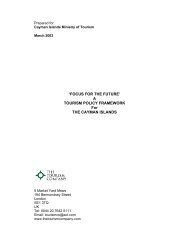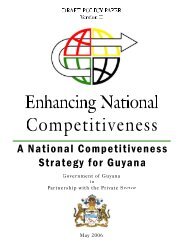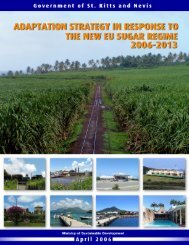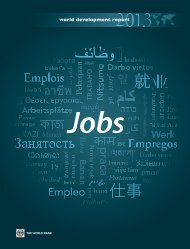Business Removing
Doing Business in 2005 -- Removing Obstacles to Growth
Doing Business in 2005 -- Removing Obstacles to Growth
- No tags were found...
You also want an ePaper? Increase the reach of your titles
YUMPU automatically turns print PDFs into web optimized ePapers that Google loves.
PROTECTING INVESTORS 55<br />
national income, compared with 40%. South Africa has<br />
among the strongest protections for equity investors and<br />
a market capitalization rivaling Switzerland’s.<br />
Small investors in Yukos, the second largest Russian<br />
oil company, have been hurt by a lack of pre-emptive<br />
rights. Here is what happened. In 1999 Yukos, the majority<br />
shareholder of Tomskneft, voted to increase the number<br />
of Tomskneft shares by 300%. The new shares were<br />
sold to off-shore companies, allegedly owned by the controlling<br />
shareholder of Yukos, without informing existing<br />
Tomskneft shareholders. The ownership of existing small<br />
shareholders dropped from 49% to 9%, reducing the<br />
payoff to investors by four-fifths. This would have been<br />
impossible in the presence of pre-emptive rights in Russian<br />
company law. At least the investors were allowed to<br />
file a derivative suit, and actually did—in another 20% of<br />
countries even that would have been impossible, including<br />
in Bangladesh, Ecuador, Kuwait and Vietnam.<br />
Enforcement<br />
Good investor protections are the ones a country can enforce.<br />
Even the best rules are useless if enforcement is<br />
weak. Some economies—such as the Kyrgyz Republic,<br />
Moldova and Nigeria—adopted strong company or securities<br />
laws, but no cases of small investors’ abuse have<br />
ever been resolved in the courts.<br />
As in any other commercial dispute, the speed, cost,<br />
and fairness of the judgment determine whether small<br />
investors would use the courts and succeed in getting<br />
compensation. Potential expropriators know this as well<br />
and calculate the risk of being caught and punished.<br />
New Zealand and Norway, where courts perform well,<br />
see less abuse of investors (figure 7.6). Colombia improved<br />
enforcement in 2002 by giving arbitration tribunals<br />
the power to issue binding judgments. A decision<br />
of the tribunal typically takes 6 months.<br />
What to reform?<br />
Start with what’s simple. Increase disclosure. Then, make<br />
it easier for small investors to challenge attempts at expropriation<br />
in the courts. Enforce harsher penalties for<br />
managers or large investors who misbehave. And encourage<br />
investors to be active in identifying bad practices.<br />
It used to be that disclosing ownership and financial<br />
information cost a lot of money. Publishing a newspaper<br />
announcement every time shares change hands, and<br />
printing quarterly financial statements cost money.<br />
Printing annual reports and reaching every small investor<br />
cost even more. The internet has changed that.<br />
Now it is almost costless to disseminate information,<br />
once it has been assembled. 21<br />
Many companies and stock exchanges are taking advantage<br />
of this. In Thailand the stock exchange publishes<br />
all ownership changes and quarterly statements on its<br />
website. Egypt increased the disclosure requirements last<br />
year and penalized about 100 companies that did not<br />
meet the higher standard. Chile required listed companies<br />
to publish quarterly financial reports and make them<br />
available electronically. Hungary passed a new Capital<br />
Markets Act, which introduces US-style disclosure of<br />
ownership and financial information. Brazil took a different<br />
path by establishing the Novo Mercado, with more<br />
stringent disclosure requirements. About 40 companies<br />
have already listed. 22 And in July 2004 the Indian government<br />
announced intentions to create a separate market<br />
for trading equity in smaller companies, with simpler<br />
disclosure requirements. This would allow the introduction<br />
of stricter disclosure for companies listed on the<br />
main market.<br />
Specialized commercial courts have been shown to<br />
improve the enforcement of debt contracts and speed up<br />
bankruptcy proceedings. They are equally beneficial for<br />
small investors who want to challenge decisions by managers<br />
or boards of directors. Some countries, such as<br />
India, channel shareholder suits into special tribunals,<br />
avoiding the delays in regular courts. Much like bankruptcy,<br />
corporate governance issues require more expertise<br />
so it pays for judges to be specialized in commercial<br />
cases. And even without specialization, cutting the procedures,<br />
time and cost to go through the regular courts<br />
will help.<br />
Disclosure requirements work only if they are<br />
backed by sufficient penalties and enforcement. Often,<br />
penalties are negligible. Two examples. In Indonesia the<br />
penalty for missing the deadline for submitting an annual<br />
report to the securities market regulator is $120.<br />
This is nothing for most companies. Not surprisingly,<br />
more than a third usually miss the deadline. 23 In Bulgaria<br />
penalties were increased in a 2003 reform, but their<br />
enforcement is woeful. An estimated 6% of the value of<br />
fines is paid. The remainder is challenged in the courts,<br />
taking years to resolve. 24<br />
Reforms in other countries show that disclosure<br />
improves with stronger penalties. Mexico has increased<br />
compliance. In 1999, 30 of its 180 companies did not<br />
meet disclosure requirements. A dozen were penalized.

















